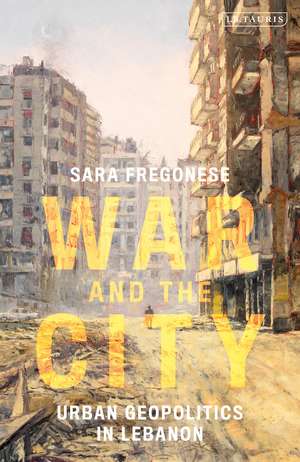War and the City: Urban Geopolitics in Lebanon
Autor Sara Fregoneseen Limba Engleză Hardback – 13 noi 2019
| Toate formatele și edițiile | Preț | Express |
|---|---|---|
| Paperback (1) | 215.51 lei 6-8 săpt. | |
| Bloomsbury Publishing – 16 iun 2021 | 215.51 lei 6-8 săpt. | |
| Hardback (1) | 653.61 lei 6-8 săpt. | |
| Bloomsbury Publishing – 13 noi 2019 | 653.61 lei 6-8 săpt. |
Preț: 653.61 lei
Preț vechi: 941.43 lei
-31% Nou
Puncte Express: 980
Preț estimativ în valută:
125.09€ • 130.25$ • 105.71£
125.09€ • 130.25$ • 105.71£
Carte tipărită la comandă
Livrare economică 08-22 martie
Preluare comenzi: 021 569.72.76
Specificații
ISBN-13: 9781780767147
ISBN-10: 1780767145
Pagini: 256
Ilustrații: 9 bw illus
Dimensiuni: 138 x 216 x 12 mm
Greutate: 0.34 kg
Editura: Bloomsbury Publishing
Colecția I.B.Tauris
Locul publicării:London, United Kingdom
ISBN-10: 1780767145
Pagini: 256
Ilustrații: 9 bw illus
Dimensiuni: 138 x 216 x 12 mm
Greutate: 0.34 kg
Editura: Bloomsbury Publishing
Colecția I.B.Tauris
Locul publicării:London, United Kingdom
Notă biografică
Sara Fregonese is Lecturer in Political Geography at the School of Geography, Earth and Environmental Sciences at the University of Birmingham, and an affiliate of the Institute for Conflict, Cooperation and Security (ICCS) at the University of Birmingham. Between 2009 and 2012, she was a British Academy Postdoctoral Fellow. She holds a PhD in Geography (Newcastle University, UK), an MA in Mediterranean Cooperation (Ca' Foscari, University of Venice) and a BA in Middle Eastern studies (Ca' Foscari, University of Venice).
Cuprins
IntroductionChapter 1: Cities in the Space of Global PoliticsChapter 2: Modernity, Territory and Conflict in LebanonChapter 3: Lebanon Salvaged: Sovereignty and Urban Space in the Republic of Lebanon (1943-1975)Chapter 4: Towards WarChapter 5: Lebanon Lost. The Urban Impact of Non-interventionChapter 6: De-subjugating Beirut's Urban Geopolitical KnowledgesChapter 7: Beirut's Hybrid Sovereignties: The May 2008 ClashesConclusionAfterword by Klaus DoddsIndex
Recenzii
This fascinating book gives the reader a visceral sense of how war pulsates through the fabric of a city, coursing in its veins, pounding against its hotel buildings, ripping apart and sewing together its neighbourhoods. The Beirut of this book is a Beirut made and unmade and remade yet again by conflict, stubbornly bearing the scars of local enmities and geopolitical conflicts on its body.
War and the City is an insightful, eloquent and dedicated book that makes strong and empirically grounded contributions to the understanding of violence in Lebanon and cities in conflict. As such, it is an impressive and highly insightful read.
No longer are wars fought only between states; conflicts are more messy, involving paramilitaries, guerrilla groups, mafias, regional and transnational powers, and civilians. Very often the terrain where they strategise and fight is the streets, squares, buildings and infrastructures of the city. Sara Fregonese's War and the City offers a particularly insightful window into these realities in the Two Years War in 1975 and 76 Beirut. She cautions that we would be wise to understand a more complex hybrid conflict where state and non-state actors vie for sovereignty and the geopolitical and urban are intertwined. Fregonese's account is specific and nuanced but with wide-ranging implications. It is well-placed to become a key text in how we understand the new urban warfare and with that, the formation of new sovereignties.
Beautifully written, well researched, this book is a fascinating exploration of the deeper entanglements between war and the urban fabric.
An important book that expands our conceptual toolbox for understanding not only Lebanese politics but also other cities in conflict.
War and the City is an insightful, eloquent and dedicated book that makes strong and empirically grounded contributions to the understanding of violence in Lebanon and cities in conflict. As such, it is an impressive and highly insightful read.
No longer are wars fought only between states; conflicts are more messy, involving paramilitaries, guerrilla groups, mafias, regional and transnational powers, and civilians. Very often the terrain where they strategise and fight is the streets, squares, buildings and infrastructures of the city. Sara Fregonese's War and the City offers a particularly insightful window into these realities in the Two Years War in 1975 and 76 Beirut. She cautions that we would be wise to understand a more complex hybrid conflict where state and non-state actors vie for sovereignty and the geopolitical and urban are intertwined. Fregonese's account is specific and nuanced but with wide-ranging implications. It is well-placed to become a key text in how we understand the new urban warfare and with that, the formation of new sovereignties.
Beautifully written, well researched, this book is a fascinating exploration of the deeper entanglements between war and the urban fabric.
An important book that expands our conceptual toolbox for understanding not only Lebanese politics but also other cities in conflict.
